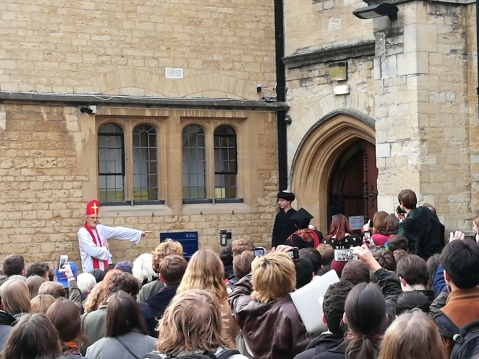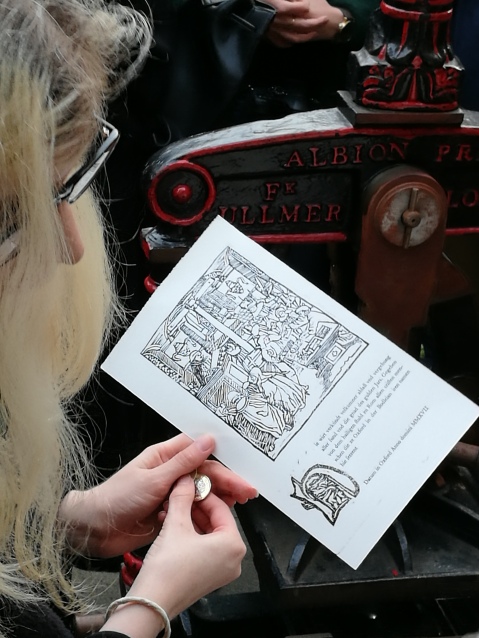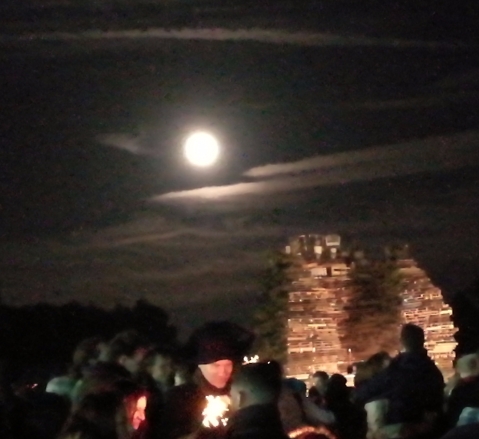Remember, remember?
By Victoria Van Hyning @vvh
On Halloween day, over a hundred members of the University of Oxford gathered outside the doors of the History Faculty to see a ‘reenactment’ of Martin Luther pinning his 95 theses to the doors of All Saints’ Church. A PhD candidate played Luther, complete with academic robe and a tonsure headpiece probably bought at a party shop. Someone else played Johann Tetzel, hawking indulgences and claiming they had the power to expiate all of our sins. Tetzel personified many of the ills against which Luther was reacting, for instance, the idea that time in purgatory could be minimized through the purchase of indulgences, rendering contrition and repentance unnecessary. Each actor exclaimed to the gathered crowd, garnering applause and knowing titters even though those of us at the back of the pack couldn’t hear much. Nonetheless, when Luther gingerly glued his theses to the door, we all cheered, perhaps a little ironically.

Here we were re-enacting a moment in history that probably never happened. Luther probably didn’t nail his theses to a door so much as send them to various opponents and powerful people in Wittenburg. Yet that imaginary act—that imaginary door—opened a much larger metaphorical door onto religious fragmentation and change in the sixteenth century that very much reverberates across the world today.
For me, as someone who studies some of the consequences of the Reformation that followed Luther’s circulation of his 95 theses, it was important to take an hour out of my research and writing schedule to witness this reenactment. I was curious to see how modern scholars and students, many of whom study the Reformation and its aftermath, would react to this event. Would it be celebratory, didactic, reflective? It was the first two, certainly. People eagerly snapped up the large format prints of the 95 theses that had been made by a local teacher of printing techniques, who had also set out his stall where people could print their own indulgences.
 A freshly printed indulgence, and silver in hand.
A freshly printed indulgence, and silver in hand.
As the theses ran out, and the print-your-own-indulgence queue thickened, I drifted away empty-handed, thinking about the difficulties faced by people on all sides of the religious debate in the centuries that followed. When I got back to my office I turned to our Shakespeare’s World data, created by members of this online community, looking for historical evidence of these struggles. Among the many thousands of pages that have been ‘retired’ by the aggregation system, after 3 or more people have transcribed each line, I found a transcription of a letter containing the plea of Sir Francis Norris, the Earl of Berkshire (1579–1622), on behalf of his fellow Catholics. He writes to James I:
How manie noblemen and worthie gentlemen most zealous in the Catholique Religion haue endured, some losse of lands & Livings, some Exile, others impri= sonment, some the effusion of blood and life for the advanncement of y<ex>ou</ex><sl>r</sl> blessed mothers right unto the Scepter of Albion, Nay whose finger did euer ake but Catholiques for y<ex>ou</ex><sl>r</sl> Ma<ex>ies</ex><sl>tie</sl>s present title & dominions? How many fledde to y<ex>ou</ex><sl>r</sl> Court offring them= =selfes as Hostastes for theire freinds, to liue and die in y<ex>ou</ex><sl>r</sl> gratious quar= =rell
V.b.234 367–8 (Unedited transcription from aggregated Shakespeare’s World data, combining the transcriptions of multiple volunteers)
Norris’s current Oxford Dictionary of National Biography (ODNB) entry does not stipulate that he was a Catholic, and I’ll be contacting the editors soon to suggest an amendment to his entry be made on the basis of this letter. Like amendments to the OED made using Shakespeare’s World data, these changes will hopefully be incorporated and point to the letter when it is hosted on EMMO.
Norris was not alone in his suffering. Countless Catholics, Anglicans, Presbyterians, Quakers, Methodists, Anabaptists, Fifth Monarchists, and many others faced persecution under monarchs and politicians of varying religious persuasions at various times. Monarchs themselves were not free to adhere to their faith of choice without criticism or even the risk of losing power. James II was notoriously suspect for his affinities with Catholics and rumours swirled around him regarding his allegiances, both religious and political.
The Luther reenactment in Oxford fell close to 5 November, Guy Fawkes Day in the UK, also known as Bonfire Night, which (in much of the UK and parts of Canada) ostensibly commemorates the foiling of a poorly-thought-out plot by radical Catholics to blow up Parliament in 1605. I say ‘ostensibly’ because many people are not familiar with the historical precedent for the bonfire (or rather, the recent historical precedent—Bonfire Night is in fact a Catholic appropriation of pre-Christian traditions long established in the British Isles).
Some communities in England burn effigies of the Pope, Guy Fawkes, and other ‘public enemies’ atop their bonfires. Kent in Surrey burnt Donald Trump in effigy in 2016.
The bonfire hosted by the Round Table charitable organization in Oxford does not burn an effigy. Instead, most years the ~30 foot pyre is topped with an empty chair, which opens multiple possible readings. Perhaps it is an invitation to mentally insert your own effigy or maybe the empty chair speaks to our remove from the events of 1605: maybe there is no need to ‘remember, remember the 5th of November’ as the old rhyme goes.

- A grainy shot of the Oxford Round Table bonfire, pre-fireworks and lighting.
I was amazed to find, back in 2007, when I temped as a secretary at a private Catholic school, that parents and children came in on the morning of the 5th asking where they could stash the Guys that their children had made, which would be burned on a bonfire on the school grounds. These Guys were just guys to the children—part of a fun annual ritual—not a Catholic who had tried to blow up Parliament.
The Luther re-enactment and Bonfire Night continue to stir my thoughts about the ways in which cultures mis-remember, and also forget. What are your experiences of cultural re/membering and forgetting?

Recent Comments